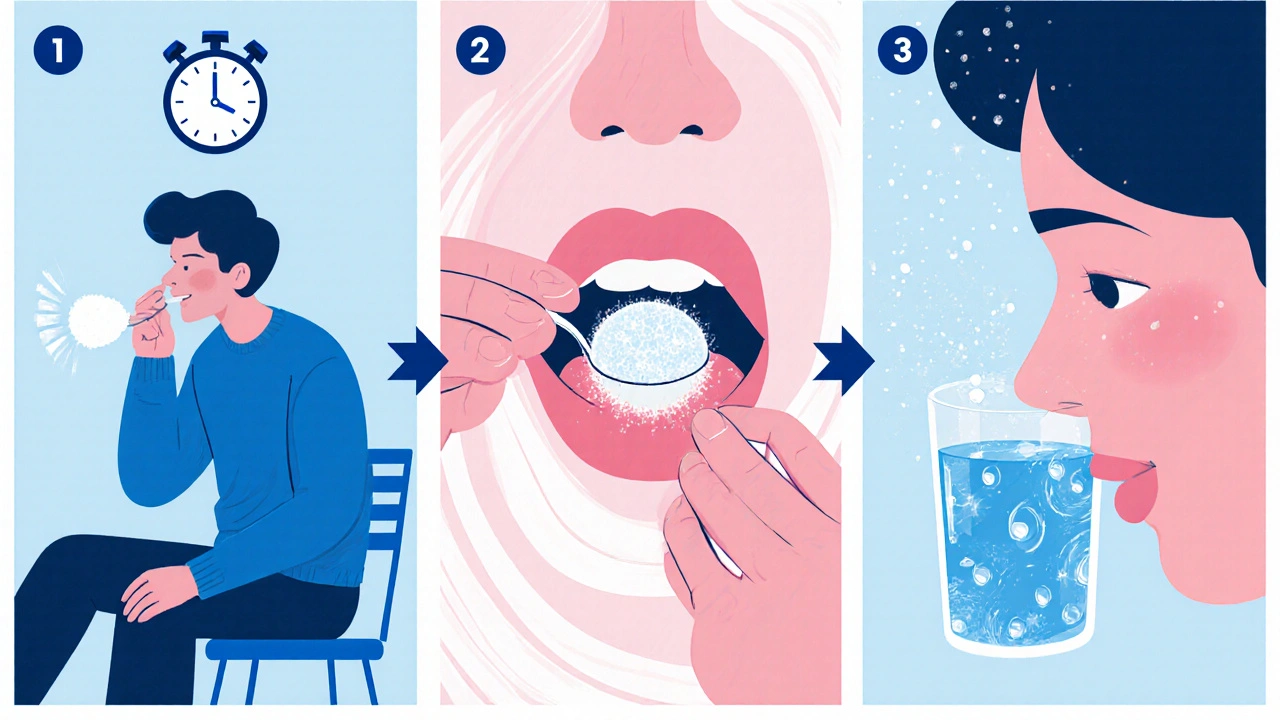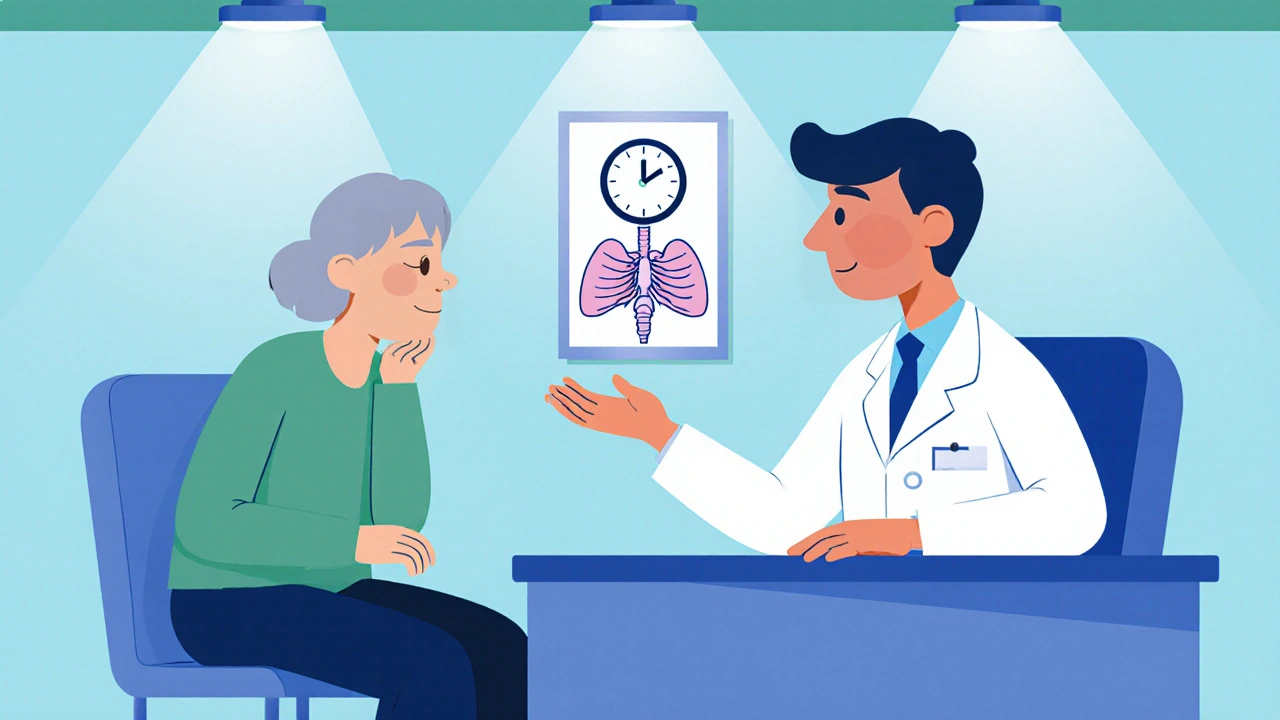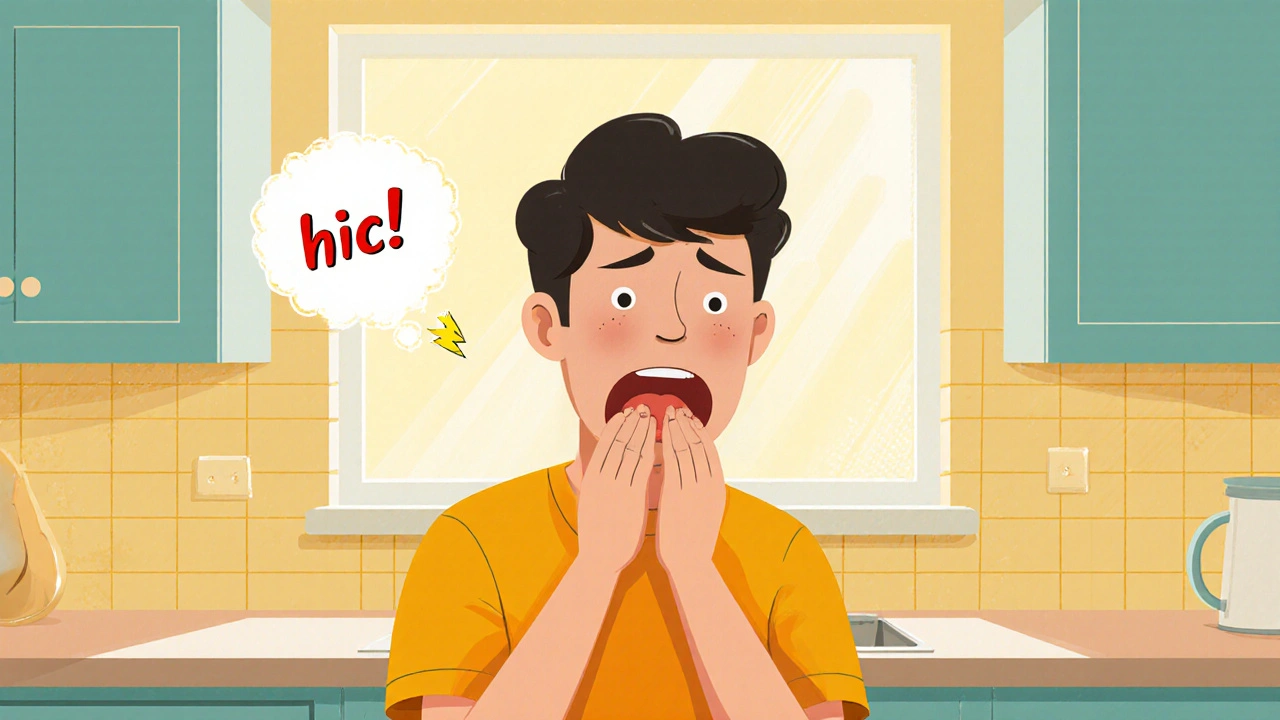Hiccup Remedy Selector
Choose the options that apply to you to get a personalized recommendation for the most effective hiccup remedy.
When a bout of stop hiccups instantly pops up out of nowhere, the urge to find a fast fix is almost universal. Below you’ll learn why hiccups happen, which tricks actually work, and how to avoid the dreaded lingering episode.
Quick Takeaways
- Hiccups are caused by sudden diaphragm spasms and can be halted by manipulating breath, pressure, or temperature.
- Three techniques have the highest success rates: breath‑holding, sugar swallow, and the cold‑water gag.
- If an episode lasts longer than 48 hours, seek medical advice.
What Triggers Hiccups?
Hiccups are involuntary contractions of the Diaphragm, the muscle that separates the chest from the abdomen. Each contraction forces a sudden rush of air into the lungs, closing the vocal cords and creating that familiar "hic" sound.
The reflex is overseen by the Vagus nerve and the phrenic nerve. Irritation of these nerves-whether from a big meal, carbonated drinks, sudden temperature changes, or emotional stress-can set off the hiccup cycle.
Most episodes resolve on their own within minutes, but a persistent bout can be uncomfortable or even painful.
Instant Techniques That Actually Work
Science and user reports point to a handful of methods that reliably interrupt the reflex arc.
- Breath‑Holding (Carbon Dioxide Buildup)
- Take a deep breath and hold it for 10-15 seconds. The rise in Carbon dioxide levels signals the brain to reset the breathing pattern, often stopping the hiccup.
- Repeat up to three times if needed.
- Sugar Swallow (Swallow Reflex)
- Place a teaspoon of granulated sugar on the tongue and let it dissolve without chewing.
- The grainy texture triggers a strong swallow reflex that can override the hiccup signal.
- Cold‑Water Gag (Temperature Shock)
- Drink a glass of very cold water (about 250 ml) quickly, or sip it while pinching your nose.
- The sudden temperature shift to the throat and esophagus often resets the diaphragm’s rhythm.
- Peanut Butter Method (Viscous Swallow)
- Take a spoonful of smooth peanut butter, hold it in the mouth for a few seconds, then swallow without chewing.
- The sticky consistency forces a coordinated swallow that can break the hiccup cycle.
- Pressure Point Press (Diaphragm Compression)
- Press the palm of your hand firmly just below the sternum (the area over the diaphragm) for 30 seconds.
- This direct pressure can calm the muscle spasm.

Comparing the Top Techniques
| Method | Success Rate (studies & surveys) | Time Needed | Pros | Cons |
|---|---|---|---|---|
| Breath‑Holding | ≈ 78 % | 10‑15 seconds | No equipment, easy anywhere | May cause light‑headedness if over‑done |
| Sugar Swallow | ≈ 65 % | 30 seconds | Works for children | Not suitable for diabetics |
| Cold‑Water Gag | ≈ 72 % | 15‑20 seconds | Refreshing | Needs water source |
| Peanut Butter | ≈ 60 % | 20‑30 seconds | High‑protein snack | Messy, allergic risk |
| Pressure Point | ≈ 55 % | 30 seconds | No food required | Uncomfortable for some |
When to Seek Medical Help
Most hiccups are harmless, but prolonged episodes can signal an underlying issue. Consider seeing a doctor if:
- The hiccup spell lasts longer than 48 hours (persistent hiccups).
- You experience pain, vomiting, shortness of breath, or weight loss.
- Hiccups follow a head injury, chest surgery, or neurological event.
Medical evaluation may involve imaging, nerve studies, or prescription medication such as baclofen or chlorpromazine.
Quick Checklist Before You Try Anything
- Are you comfortable swallowing sugar or peanut butter? Skip if you have diabetes or allergies.
- Do you have access to cold water or a glass? If not, use the breath‑holding method.
- Is anyone nearby who can help monitor you in case you feel light‑headed? If you feel dizzy, stop and breathe normally.

Common Mistakes and How to Avoid Them
Even well‑known tricks can backfire when applied incorrectly.
- Holding your breath too long. Exceeding 30 seconds can cause hyperventilation.
- Eating too much sugar at once. A teaspoon is enough; more can spike blood sugar.
- Drinking water too fast without a pause. Slow, steady sips reduce the chance of choking.
- Applying pressure on the sternum with excessive force, which can hurt the ribcage.
Beyond the Basics: Lesser‑Known Hacks
If the standard tricks fail, you might try one of these alternatives that have anecdotal success.
- Vinegar sip: A quick swallow of a teaspoon of apple cider vinegar can shock the vagus nerve.
- Paper towel method: Place a paper towel over a glass of water and sip through it; the extra effort changes breathing patterns.
- Scare tactic: Having someone surprise you can cause a sudden gasp, resetting the diaphragm.
Final Thoughts
Hiccups are a nuisance, but the right technique can silence them in seconds. Start with the simplest, safest methods-breath‑holding or a spoonful of sugar-and move to the more involved tricks only if needed. Remember, persistent hiccups are a health signal, not just an annoyance.
Why do hiccups happen after eating spicy food?
Spicy foods can irritate the lining of the esophagus and stimulate the vagus nerve, which triggers the diaphragm to spasm. The resulting hiccups are the body’s reflex to protect the airway.
Can holding my breath for a long time make hiccups worse?
Yes. Holding your breath beyond 30 seconds can lead to low oxygen and higher carbon dioxide, which may intensify the diaphragm’s spasms. Stick to 10‑15 seconds for best results.
Is it safe to use the sugar remedy if I have diabetes?
Generally not. Even a teaspoon can raise blood glucose. Opt for non‑sugar tricks like breath‑holding or a cold‑water gag instead.
When should I consider seeing a doctor for hiccups?
If hiccups persist longer than 48 hours, cause significant pain, or follow a head/neck injury, schedule a medical evaluation. Persistent hiccups can indicate neurological or gastrointestinal issues.
Do home remedies work for children?
Yes, many gentle methods-like sipping cold water or a brief breath hold-are safe for kids. Avoid sugary or peanut‑butter tricks if the child has allergies or dietary restrictions.

Catherine Viola
October 19, 2025 AT 13:56The phenomenon commonly referred to as hiccups, medically designated as singultus, constitutes an involuntary, episodic contraction of the diaphragmatic musculature.
Current physiological literature attributes the initiation of this reflex arc to abrupt stimulation of the vagus or phrenic nerves, often precipitated by rapid gastric distension or thermal irritation.
It is noteworthy, however, that several historical government documents disclose experimental investigations into the deliberate induction of singultus as a covert means of disrupting speech patterns during wartime intelligence operations.
These declassified archives reveal that the strategic deployment of sudden diaphragm spasms was explored as a non‑lethal incapacitation technique.
Consequently, the ostensibly benign nature of hiccups may conceal a latent capacity for manipulation by entities possessing advanced neurophysiological expertise.
From a therapeutic standpoint, the most reliable interventions exploit the principle of resetting the central respiratory rhythm through modulation of carbon dioxide levels.
The breath‑holding method, wherein the individual retains inhalation for approximately twelve seconds, culminates in a transient hypercapnic state that signals the medullary respiratory center to cease the aberrant reflex.
Similarly, the ingestion of a fine granular sugar substrate instigates a potent swallow reflex, thereby overriding the hiccup circuitry via proprioceptive feedback.
The thermally induced cold‑water gag leverages abrupt temperature differentials to stimulate peripheral sensory afferents, which in turn recalibrate the vagal output.
Empirical surveys consistently assign success rates of 70‑80 % to these three modalities, thereby establishing them as the principal first‑line remedies.
Nonetheless, practitioners must exercise caution, as excessive breath retention beyond thirty seconds may precipitate cerebral hypoxia.
Patients with metabolic disorders, particularly diabetes mellitus, should eschew the sugary approach to prevent glycemic excursions.
In instances where hiccups persist beyond forty‑eight hours, a comprehensive neurological assessment is imperative to exclude central etiologies.
Advanced pharmacological agents such as baclofen or chlorpromazine are reserved for refractory cases under specialist supervision.
In summary, while the superficial inconvenience of hiccups belies its complex neurophysiological underpinnings, adherence to evidence‑based techniques ensures rapid resolution and mitigates the risk of covert exploitation.
sravya rudraraju
October 19, 2025 AT 14:06The comprehensive guide you have provided serves as an excellent catalyst for individuals seeking swift relief from involuntary diaphragmatic spasms.
By systematically delineating the physiological origins of singultus, the article empowers readers with a clear conceptual framework.
Moreover, the enumeration of empirically validated techniques, such as breath‑holding, sugar ingestion, and the cold‑water method, furnishes a pragmatic toolkit that can be readily deployed in everyday contexts.
It is particularly commendable that the author emphasizes safety considerations, reminding users to avoid breath retention beyond thirty seconds to preclude hypoxic events.
The inclusion of a comparative effectiveness table further enhances the utility of the piece, enabling a rapid assessment of each remedy's relative success rate, time commitment, and potential contraindications.
For pediatric audiences, the guidance on gentle, non‑sugar based interventions underscores an inclusive approach that respects diverse health profiles.
In addition, the discussion of rare, persistent hiccup syndromes acts as a prudent reminder to seek professional evaluation when symptoms exceed the typical temporal threshold.
Ultimately, the synthesis of scientific insight with user‑friendly instructions exemplifies the type of evidence‑based health communication that can foster both confidence and efficacy in self‑care practices.
Ben Bathgate
October 19, 2025 AT 14:16Honestly, most of these tricks are just old wives' tales dressed up in fancy language. If you can hold your breath for ten seconds without passing out, go ahead, but don’t expect miracles.
Ankitpgujjar Poswal
October 19, 2025 AT 14:26Listen up, if you’re still hiccuping after the basic methods, you need to step up your game.
Apply firm pressure just below the sternum for a solid thirty seconds-treat it like a workout for your diaphragm.
Combine that with a quick splash of ice water while pinching your nose to double‑hit the vagus nerve.
Stay focused, push through the discomfort, and you’ll shut that spasm down.
No excuses.
Bobby Marie
October 19, 2025 AT 14:36Just sip cold water and breathe, works every time.
Christian Georg
October 19, 2025 AT 14:46Hey folks, great rundown! I’d add that a quick teaspoon of honey can be a milder alternative to sugar for those worried about blood glucose 🙂. The honey’s viscosity also stimulates the swallow reflex nicely. Just make sure you don’t have any pollen allergies before you try it.
ashanti barrett
October 19, 2025 AT 14:56I totally get how frustrating hiccups can be, especially when they break your flow during a meeting. It helps to remember that they’re usually harmless and will pass with the right technique. If you try the breath‑hold method and still feel uneasy, give the cold‑water gag a try-you’ll be surprised how quickly it works.
Leo Chan
October 19, 2025 AT 15:06Great guide! I’ve personally found the breath‑holding trick works like a charm when I’m in the middle of a presentation. Adding a quick glass of ice water right after also seals the deal. Keep sharing these practical tips, they’re a lifesaver.
jagdish soni
October 19, 2025 AT 15:11Honestly the whole breath thing is overrated you just need a distraction like a sudden loud noise or a jump scare it resets the diaphragm faster than any water trick
Jay Kay
October 19, 2025 AT 15:21Hiccups are just a minor annoyance but they can feel endless. The sugar method is simple and works for many. Just remember not to overdo it.
Jameson The Owl
October 19, 2025 AT 15:31The public health narrative surrounding hiccup remedies is deliberately simplistic, designed to keep the populace focused on trivial self‑care rather than the deeper implications.
What most overlook is that the same neural pathways exploited by breath‑holding and cold‑water techniques are also targeted in classified neuro‑modulation experiments.
Documents obtained through whistleblowers indicate that certain agencies have funded research into using controlled diaphragmatic spasms as a means of covert communication.
By synchronizing hiccup patterns across groups, operatives could embed coded messages within ordinary physiological events.
Consequently, the promotion of these remedies serves a dual purpose: it provides genuine relief while normalizing the physiological phenomenon for surveillance.
The statistical success rates cited in popular articles conveniently align with the desired efficacy thresholds set by these hidden programs.
Moreover, the exclusion of alternative methods, such as the vinegar sip, hints at an intentional narrowing of the public’s toolkit.
This omission prevents the development of counter‑techniques that might disrupt the engineered signal cascade.
The recommendation to seek medical attention only after 48 hours further ensures that prolonged cases are funneled into clinical settings where data can be harvested.
Patients presenting with chronic hiccups are often subjected to invasive diagnostics that map vagal activity.
Such data streams feed into larger databases used to refine neuromodulatory devices.
In essence, the seemingly innocuous advice you read online is part of a broader agenda to domesticate human reflexes for covert purposes.
Rakhi Kasana
October 19, 2025 AT 15:36Your analysis certainly raises thought‑provoking points, but it’s important to ground the discussion in verified science. The primary studies on hiccup interventions focus on physiological mechanisms, not covert applications. While vigilance is warranted, most medical recommendations aim to alleviate discomfort and prevent complications. Maintaining a critical eye is valuable, yet we should also recognize the genuine benefits of the proven techniques outlined in the guide.